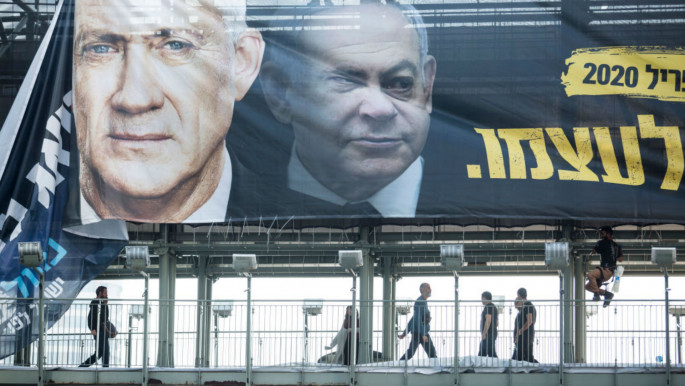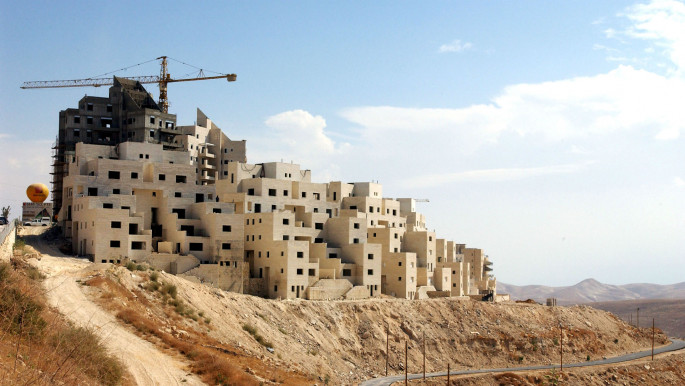Israel's coronavirus coup: Netanyahu's tightening grip on power bodes badly for Palestinians
Israel's coronavirus coup: Netanyahu's tightening grip on power bodes badly for Palestinians
Palestinians have been dealt a painful political blow after Benny Gantz folded and decided to join a unity government, allowing Netanyahu to tighten his grip on power in Israel.
5 min read
Benny Gantz has decided to join rival Netanyahu in a unity government. [Getty]
As Palestinians struggle to limit the spread of the coronavirus, they have also been dealt a painful blow in the political realm in the form of a fresh lease on power for Israeli Prime Minister Benjamin Netanyahu.
A decision last week by Benny Gantz, Netanyahu's rival in three inconclusive rounds of elections over the last year, to join him in a national unity government means Netanyahu will remain at the helm for another year and a half, despite facing trial over corruption allegations.
He will also retain influence for a further 18 months after that, as Gantz's deputy and stand in. Both men cited the need to confront the coronavirus as an imperative for unity.
He will also retain influence for a further 18 months after that, as Gantz's deputy and stand in. Both men cited the need to confront the coronavirus as an imperative for unity.
Continuity in power for Netanyahu, who has served as premier since 2009, is decidedly bad news for Palestinians.
"The Palestinian political elite believes Netanyahu can be more dangerous than anyone else," said Ghassan Khatib, a former Palestinian Authority minister who teaches at Bir Zeit University in the West Bank.
"He's a manipulator more than any other leader, he has stronger alliances with right-wing settlers than any other leader and he has dangerous alliances internationally with [US President Donald] Trump and other right-wing leaders."
Palestinian observers expect more settlement expansion, more disregard for the Palestinian side of the conflict and the continuation of the Israeli premier's efforts at normalisation with countries in the Arab world.
 |
|
| Read more: Gantz discards Joint List and cedes the throne to Netanyahu |
Some believe preoccupation with the coronavirus pandemic will delay Netanyahu's stated intention to formally annex parts of the occupied West Bank in keeping with US President Donald Trump's 'deal of the century' plan to ostensibly resolve the conflict. But, they add, annexation will remain a long-term goal.
"Another term for Netanyahu will probably bring the idea of two states [as a solution to the conflict] to an end and increase the crisis for the Palestinian leadership whose program is the two-state solution," Khatib says.
This, he adds, is because even if he stops short of de jure annexation in the West Bank, Netanyahu will thicken settlements and undermine the Palestinian presence in the strategic Jordan River valley, and in what is known as Area C.
This, he adds, is because even if he stops short of de jure annexation in the West Bank, Netanyahu will thicken settlements and undermine the Palestinian presence in the strategic Jordan River valley, and in what is known as Area C.
Area C is part of the occupied West Bank that remained under full Israeli control according to self-rule agreements, and which Palestinians view as the vital hinterland of their future state.
 |
Continuity in power for Netanyahu, who has served as premier since 2009, is decidedly bad news for Palestinians |  |
Netanyahu explicitly pledged to formally annex the Jordan Valley as part of his election campaign and he might carry this out to deflect attention from his corruption trial, in the view of Abdullah Abdullah, former chairman of the politics committee of the Palestinian Legislative Council.
"The primary goal of Netanyahu is to evade court proceedings," Abdullah said. "To galvanise public support he may try annexation".
Read more: Lebanon's revolution is on hold but far from over
"The primary goal of Netanyahu is to evade court proceedings," Abdullah said. "To galvanise public support he may try annexation".
Read more: Lebanon's revolution is on hold but far from over
But Mkhaimar Abusada, a political scientist at al-Azhar University in Gaza, believes that the coronavirus crisis, as well as adamant Jordanian opposition to such a step, means formal annexation will be postponed.
"It would be absurd to go with annexation while the whole world is fighting corona," he said. "This is not the time for it, it's time to concentrate on health issues." Jordan has warned that Israeli annexation of the Jordan Valley could jeopardise the 1994 peace treaty between the two nations.
Gantz, who opened up his election campaigning last year with advertisements boasting of how much destruction he had wrought in Gaza as army chief of staff during the 2014 war, is not expected to be much of a restraining influence on Netanyahu.
"It would be absurd to go with annexation while the whole world is fighting corona," he said. "This is not the time for it, it's time to concentrate on health issues." Jordan has warned that Israeli annexation of the Jordan Valley could jeopardise the 1994 peace treaty between the two nations.
 |
|
| Palestinian observers expect more settlement expansion under Netanyahu. [Getty] |
Gantz, who opened up his election campaigning last year with advertisements boasting of how much destruction he had wrought in Gaza as army chief of staff during the 2014 war, is not expected to be much of a restraining influence on Netanyahu.
He has accepted the principles of Trump's 'deal of the century' and endorsed an annexation of the Jordan Valley that is coordinated with the international community, terming the area "an inseparable part of the state".
Read more: For Middle East refugees, social distancing is a privilege few can afford
No less significant, Gantz refused to rely on Arab legislators in his efforts to form a government and spoke during the campaign of a need for a "Jewish majority," a position that had echoes of Netanyahu's delegitimisation of Arab political representation.
In the view of Menachem Klein, a political scientist at Bar Ilan University, near Tel Aviv, Netanyahu and Gantz view the future of the West Bank similarly. "Gantz will support the 'state minus' view of Netanyahu and Trump, which means clusters of Palestinian autonomy."
Zalman Shoval, a former Israeli ambassador to the US who is a member of the central committee of Netanyahu's Likud party, says Netanyahu will continue to increase settlement construction in the vicinity of existing settlement clusters without formal annexation.
 |
Netanyahu wants to continue the status quo for as long as is needed |  |
"Netanyahu sees two bad options for Israel," he says. "One is one state for two peoples and the other is a Palestinian state run by radical adversaries of Israel. Therefore, he wants to continue the status quo for as long as is needed."
In Abusada's view, Netanyahu continuing in office is "bad news for the Palestinian Authority but good news for Hamas," the militant Islamist group that controls Gaza.
This, Abusada posits, is because Netanyahu believes that continued Hamas control in Gaza keeps Palestinians divided and thus foils Palestinian statehood aspirations.
He cites Israeli approval of the disbursement of Qatari funds in the Strip as evidence of this. "Netanyahu is beefing up Palestinian division," Abusada says.
 |
|
| Read more: The four Palestinian women behind stunning Joint List surge in Israel's elections |
This, Abusada posits, is because Netanyahu believes that continued Hamas control in Gaza keeps Palestinians divided and thus foils Palestinian statehood aspirations.
He cites Israeli approval of the disbursement of Qatari funds in the Strip as evidence of this. "Netanyahu is beefing up Palestinian division," Abusada says.
Still, it is best not to make too many predictions these days, Abusada cautioned.
"We have to wait and see what the world will look like after Corona. Some Palestinians are hoping the US won't be a superpower anymore because of economic stagnation. Everyone wants to see how it will be in Israel, the US and China. It's best to wait and see. It's hard to make serious guesses at the moment."
Ben Lynfield is a journalist currently based in Jerusalem.
"We have to wait and see what the world will look like after Corona. Some Palestinians are hoping the US won't be a superpower anymore because of economic stagnation. Everyone wants to see how it will be in Israel, the US and China. It's best to wait and see. It's hard to make serious guesses at the moment."
Ben Lynfield is a journalist currently based in Jerusalem.


![President Pezeshkian has denounced Israel's attacks on Lebanon [Getty]](/sites/default/files/styles/image_684x385/public/2173482924.jpeg?h=a5f2f23a&itok=q3evVtko)



 Follow the Middle East's top stories in English at The New Arab on Google News
Follow the Middle East's top stories in English at The New Arab on Google News


